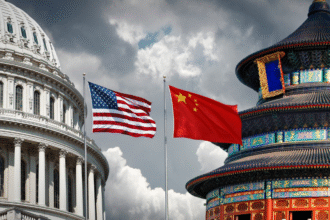Ford, one of the most famous car brands in the U.S., has seen the U.S. auto tariffs have a big effect on its costs. Ford now expects to pay around $2 billion this year because of tariffs, even though most of its cars are made in the U.S.
- Why are Ford’s tariff costs going up even though they makes cars in the U.S.?
- What Are Ford’s Rivals Doing About Tariffs?
- What is Ford doing to lower the cost of tariffs?
- How do tariffs affect how much faith investors have?
- What Will Happen to U.S. Automakers in the Future?
- Conclusion: Tariffs are changing the way the car industry works.
This new estimate, which is higher than previous ones, shows how trade conflicts have become more unstable and longer-lasting. Ford had to pay an extra $800 million in duties in the last three months, which ended in June. That’s on top of the money lost when a big electric vehicle program had to be cut back.
Ford’s leaders admitted that these tariffs are having a bigger and longer-lasting effect than they thought they would. The scenario shows a bigger trend that is harming both domestic and international businesses in the auto industry.
Why are Ford’s tariff costs going up even though they makes cars in the U.S.?
People would think that making cars mostly in the U.S. would protect Ford from the costs of doing business with other countries. But the effect of the U.S. car tariffs isn’t simply about where the final product is put together. It’s also about where parts, raw materials, and other things come from.
Ford’s Chief Financial Officer, Sherry House, said that the corporation has operations in both Canada and Mexico. These activities, which are very important to Ford’s supply chain, have had to deal with longer and higher-than-expected taxes.
House stated, “We thought things would get better by now, but the high tariffs from our neighbors have stayed in place longer than we thought they would.”
The U.S. has also put tariffs on important goods like steel and aluminum. These inputs are very important for making cars and make up a large part of the costs of making them. Because of this, even cars made in the United States are being affected by trade conflicts throughout the world.
What Are Ford’s Rivals Doing About Tariffs?
Ford isn’t the only company that has to cope with these expenditures. The effects of the U.S. car tariffs have rippled throughout the whole industry. Recently, General Motors said that tariffs have already cost them more than $1 billion. Volkswagen, on the other hand, said it lost almost $1.5 billion because of the same trade problems.
Each company has its own set of problems based on where it gets its parts and puts them together, but the pattern is clear: tariffs are harming profits.
The car business has a lot of sales but low profit margins. Even small rises in production costs can have a big effect on profits. Automakers are now looking at their global supply networks again and moving some operations and sourcing to cut down on financial losses.
What is Ford doing to lower the cost of tariffs?
Ford’s CEO, Jim Farley, said that the business is always in touch with the U.S. government and is trying to get lower tariffs, notably on parts and materials used to make cars that are brought in from other countries.
Farley said, “There is a lot of potential for us, depending on how the talks with the administration go.” He stressed how important it is to get exemptions or lower tariffs that are hurting manufacturers in the U.S.
The Trump administration’s trade policy has been to get corporations to make more things in the U.S. While that ambition fits with Ford’s current production footprint, the truth is that no automaker works alone. Supply chains are worldwide, and cars made in the U.S. often use parts and resources from other countries.
Ford is still hoping that things will get better as talks go on, but the company is also making changes to how it does business in case tariffs last longer than expected.
How do tariffs affect how much faith investors have?
Ford’s stock price fell by about 1.5% in after-hours trading after the company said it will have to pay more in tariffs and change its earnings projection. That may seem like a minor drop, but it shows that investors are worried about more than just that.
Wall Street is quite sensitive to costs that come up unexpectedly, especially those that seem to be out of a company’s control. The U.S. auto tariffs make things even less certain, making it harder to prepare for the future and estimate earnings.
Investors are now paying careful attention to how Ford and the rest of the industry deal with these trade problems. To keep people’s trust, there needs to be clear instructions, open strategies, and successful discussions. Read another article on Canada Imposes Tariffs on China Exports
What Will Happen to U.S. Automakers in the Future?
Ford’s dilemma is part of a bigger change in how American carmakers need to think about making cars. Making cars in the U.S. does offer some protection, but the effects of the U.S. auto tariffs illustrate that the industry is still very dependent on other countries.
In reaction, car companies can start moving their supply chains, making new international relationships, or getting raw materials in various ways. But these adjustments take time and a lot of money.
In the medium term, corporations like Ford will have to find a balance between being flexible in their operations and putting pressure on politicians to lower tariffs. In the long run, the focus may move to constructing supply networks that are more resilient and localized so that they can better adjust to changes in trade.
Conclusion: Tariffs are changing the way the car industry works.
The $2 billion tariff knock on Ford is more than just a financial problem; it’s a message to the whole industry. The effects of the U.S. vehicle tariffs are real, getting worse, and hard to escape. Companies that make a lot of things in the US are also hurting.
This is a time for Ford to change. It needs to keep an eye on short-term costs while also pressing for policy changes and improvements to the way things are set up in the long term. Other car companies may do the same, learning from each other as they deal with this complicated situation.
One thing is certain: tariffs are no longer a transient problem; they are already a key part of modern automotive strategy.








